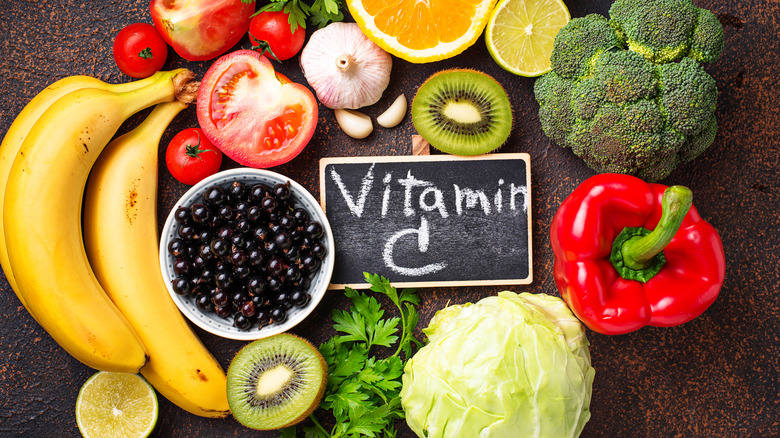Does Taking Vitamin C Daily Really Boost Your Immune System?
Oh, the wonders of vitamin C. Not only does it act as a powerful antioxidant, but this mighty nutrient also supports the health of our bones, blood, skin, and much more, according to Medical News Today. Able to be obtained from our diet, many people amp up on levels of vitamin C when they start to feel under the weather. Although more research is needed as to whether or not vitamin C can treat the common cold virus, experts state that vitamin C may help in other ways by naturally boosting our immunity. To find out for sure, Health Digest spoke with Jamie Feit, MS, RD, CDN of Jamie Feit Nutrition, LLC, who confirmed that, yes, in addition to its many other powers, vitamin C can do wonders for our immune system too.
"Vitamin C is a vitamin often known to support our immune system," Feit states. She outlines four main ways in which the vitamin supports our immune health. The first is through growth and repair, Feit explains. "Vitamin C is needed for maintaining the integrity of our bones, teeth , cartilage and skin," she says. By supporting the growth and repair of our skin's protective elements, Feit states this also helps promote wound healing. "Our skin protects us from stress and toxins in the environment, vitamin C boosts our immune system by being a cofactor for many cellular processes that support a healthy endothelial barrier."
Antioxidant properties and protection against infection
Feit goes on to tell Health Digest how the antioxidant properties in vitamin C can also support immune health. "Vitamin C has antioxidant properties that fight against the free radicals in our body that cause damage to our healthy cells," she states. Targeting contaminants from environmental pollutants, Feit says that vitamin C may specifically help protect against heart and lung disease, inflammation, and the development of certain cancers.
The third immune-boosting benefit vitamin C has to offer is its ability to protect against infection. It may also potentially help accelerate healing from illness. "Vitamin C may not protect against the common cold, however, it might decrease the length of time that you are sick," Feit explains. "Historically we know that a deficiency of vitamin C can cause scurvy. One of the symptoms of scurvy was infections," she says. "When you are sick, be sure to consume foods high in vitamin C," she advises. This can include broccoli, strawberries, spinach, citrus, and more.
A word about vitamin C supplements
While brussels sprouts, peppers, and tomatoes may sound great to some of us, what about daily vitamin C supplements as an alternative to food sources? "Supplementation is controversial," Feit tells Health Digest. "Although it has been proven that supplementation with high doses of vitamin C will shorten the duration of the common cold or reduce the severity of pneumonia, there can also be unpleasant side effects, most bothersome being gastrointestinal," she explains.
For this reason, Feit suggests sticking with food sources to get a healthy dose of vitamin C. "It is entirely possible to get enough vitamin C from food when consuming a healthy diet," she says. "Popeye had it right with his consumption of spinach...which contained plenty of vitamin C," she says, encouragingly. For those who ultimately prefer supplements, however, Feit advises taking safe amounts of no more than 0.2 grams daily or between 4 to 8 grams as a therapeutic dose.



